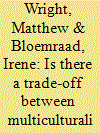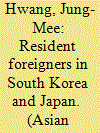| Srl | Item |
| 1 |
ID:
113539


|
|
|
|
|
| Publication |
2012.
|
| Summary/Abstract |
Across immigrant-receiving democracies on both sides of the Atlantic, policies of "cultural recognition" (e.g., "multiculturalism") have become a convenient punching-bag for political elites. Among academics, heated theoretical debates exist over whether such policies foster or hinder immigrants' engagement with their adoptive nation. We provide a novel empirical assessment of this debate from the immigrant perspective. We ask how multicultural and citizenship policies influence immigrants' socio-political engagement with their adoptive nation in three realms: social inclusion, political inclusion, and political engagement. Using a variety of cross-national and single-country surveys, we show that multiculturalism in no case hinders engagement with society and government, and in many cases seems to foster it. Thus, the claim that multiculturalism undermines immigrants' socio-political integration appears largely without foundation.
|
|
|
|
|
|
|
|
|
|
|
|
|
|
|
|
| 2 |
ID:
144301


|
|
|
|
|
| Summary/Abstract |
Over the past two decades Korea and Japan have experienced a rapid inflow of foreign population into their homogeneous societies. Despite their many similarities in immigration control policies, Korea and Japan have differed in their politics of immigrant incorporation. Korea's central government has instituted policies that favor female marriage migrants and children of international marriages, while Japan's local governments have initiated policies for a wide range of foreign residents in their communities. I argue that the different boundaries of citizenship for specific groups of the foreign population, created and reinforced by the state, explain variations in the politics of immigrant incorporation policies in the two countries
|
|
|
|
|
|
|
|
|
|
|
|
|
|
|
|
| 3 |
ID:
149051


|
|
|
|
|
| Summary/Abstract |
Although South Korea and Japan tend to maintain their identity as nonimmigration countries, a policy agenda for foreign residents has incrementally emerged, especially since the 1990s. In this comparative analysis, I examine the status of permanent and long-term residents and relevant policy changes that enhance their social and political rights regardless of naturalization. Permanent residents in Japan can access social welfare benefits such as the national pension, public assistance, and child allowances, but they are excluded from local suffrage. In contrast, permanent residents of South Korea have political rights in local elections while welfare coverage for them is restricted to public insurance, with no public aid entitlement. This difference represents a policy gap, caused by inconsistencies in the process of policy revisions and different priorities in policymaking.
|
|
|
|
|
|
|
|
|
|
|
|
|
|
|
|